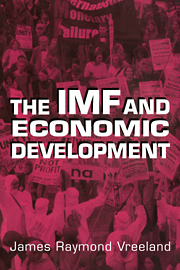Book contents
- Frontmatter
- Contents
- List of Tables and Figures
- Acknowledgements
- 1 Introduction
- 2 Analytically Significant Cases
- 3 An Analytical Approach to the Politics of IMF Agreements
- 4 Testing the Selection Story
- 5 The Effect of IMF Programs on Economic Growth
- 6 Distributional Consequences of IMF Programs
- 7 Conclusions
- Appendix 1 Variables Used in This Study
- Appendix 2 Country-Years in Samples
- References
- Index
1 - Introduction
Published online by Cambridge University Press: 08 January 2010
- Frontmatter
- Contents
- List of Tables and Figures
- Acknowledgements
- 1 Introduction
- 2 Analytically Significant Cases
- 3 An Analytical Approach to the Politics of IMF Agreements
- 4 Testing the Selection Story
- 5 The Effect of IMF Programs on Economic Growth
- 6 Distributional Consequences of IMF Programs
- 7 Conclusions
- Appendix 1 Variables Used in This Study
- Appendix 2 Country-Years in Samples
- References
- Index
Summary
The International Monetary Fund is at a crossroads. Its apparent power to dictate broad programs to sovereign nations has never before beengreater. In the year 2000 alone, sixty countries participated in IMF programs intended to promote international financial stability and national prosperity. Yet, in the aftermath of the East Asian financial crisis (1997–8), where financial instability in Thailand, Indonesia, Korea, and Japan, followed by Russia and Brazil affected the lives of hundreds of millions of people and threatened economic turmoil in the rest of the world, the IMF has come under close scrutiny. Calls for its reform or even dissolution have come from across the political spectrum.
The recent debate has largely focused on the question of whether the IMF should be in the “development business.” That is, when providing loans to developing countries, should the Fund impose specific policy prescriptions (a practice called conditionality) to promote economicgrowth? At one extreme is the International Financial Institutions Advisory Committee (the Meltzer Commission), commissioned by the U.S. Congress in the aftermath of the East Asian crisis. It recommends that the IMF focus entirely on crisis prevention and cease the practice of providing loans with policy conditions after a country has already entered into a crisis. A more moderate view is taken by the Council on Foreign Relations, commissioned by President Clinton, which does not advocate doing away entirely with ex post policy conditions, but recommends that the IMF avoid long-term reform programs and focus rather on short-term crisis management.
- Type
- Chapter
- Information
- The IMF and Economic Development , pp. 1 - 19Publisher: Cambridge University PressPrint publication year: 2003



